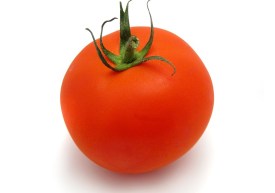Tomato; the summertime superfood

The tomato is one of the most commonly cultivated and consumed foods in North America. The tomato is a member of the nightshade family, including potato and eggplant. Some individuals may have an allergy or sensitivity to this family of foods, which is something that can be tested for through your Naturopathic Doctor or allergist.
There are many varieties of tomatoes, including Beefsteak, Plum, Cherry and Heirloom. No matter what variety, all tomatoes contain a multitude of beneficial vitamins, minerals and molecular compounds. One such compound is lycopene. Lycopene is a carotenoid found in tomatoes, carrots, watermelons and papayas, and gives these fruits their red-orange colour. This pigment acts as a powerful antioxidant, protecting the fruit from free-radical damage [free radicals are electron hungry ions that cause damage to other molecules by stealing their electrons]. Free radicals are formed in multiple ways including stress and prolonged sun exposure. Lycopene has a similar effect in our bodies as it does in the fruit, helping to quench free radicals in our blood and tissues. Some studies have found lycopene to be 100 times more potent than vitamin E as an antioxidant. Interestingly, one study found that eating tomatoes consistently for 10-12 weeks before sun exposure, provided individuals with increased protection against sunburn.
Besides lycopene, tomatoes contain a multitude of other beneficial compounds. Tomato skins contain a compound called naringenin chalcone, which has anti-allergy properties, helping to stabilize histamine releasing cells. A randomized, double-blind, placebo controlled trial (RCT) done on 33 individuals with seasonal allergies used tomato extract (from tomato peels and seeds) or placebo for 8 weeks in order to determine if tomato extract can alleviate some of the symptoms of seasonal allergies. The study found that sneezing, runny nose and blocked nose were all decreased in the tomato extract group while the placebo group had no significant change. Furthermore quality of life was reported to be increased in the group that took tomato extract.
Tomatoes have also been shown to be very beneficial for preventing cardiovascular disease. One of the ways tomatoes do this is by inhibiting blood clotting in individuals prone to inflammation. An RCT done in 2006 by the American Journal of Nutrition demonstrated that in blood samples given by healthy individuals 3 hours after consuming a tomato extract, platelet aggregation was significantly reduced. Furthermore in individuals with high levels of plasma homocysteine and C-reactive protein (laboratory markers of inflammation) inhibition of platelet aggregation was most pronounced. The authors concluded that tomato extract may have a role in the primary prevention of cardiovascular disease by reducing platelet activation, which could contribute to a reduction in thrombotic events.
Tomatoes have a very important role to play in the treatment and prevention of several types of cancer. A clinical trial in 2002 investigated the effects of lycopene supplementation in individuals with prostate cancer. Twenty-six men with prostate cancer were randomly assigned to receive a tomato extract containing 30 mg of lycopene or nothing, 3 weeks before prostatectomy. After 3 weeks the prostatic tissue was evaluated. The results demonstrated that in the group taking the tomato extract, the tumours were smaller and less diffuse. Prostate specific antigen levels (a laboratory marker for prostate cancer) were lower in the intervention group compared to the control group.


